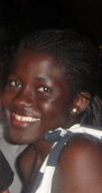Week 2: A Day in the Life...by Nzuekoh Nchinda As I ride the shuttle bus each morning to the Longwood Medical Area, I become increasingly excited for what the day will have in store. Days at the Fortune Lab are far from boring, since each one brings a new learning experience, broadening my knowledge of both laboratory techniques as well as the vast scope of public health. On most days, I immediately start on my project. Conducting the necessary lab procedures takes a full 9:30am to 5:30pm day. But time always seems to fly by—despite repeating the same procedures daily, work never feels monotonous. What makes bench science so stimulating is that the potential result of your procedure is always unexpected. I may perform the same basic technique multiple times, but each time I make slight adjustments based upon the results of previous experiments. And the results of each procedure are different. So much of lab work is based upon trial and error. There have been days when all of my procedures failed to yield the results I needed. But then that moment comes when that desired result occurs. From that moment, I gain a deeper understanding of the bacterial mechanisms taking place in my project. It is that moment of discovery that keeps lab work exciting. Throughout the day, I check in with the two graduate school students that supervise me and my lab partner. We discuss the results from each procedure and use biological knowledge of the bacterial mechanism and the objectives of each lab process to better tailor each step in the project. I find it refreshing to approach concepts covered in my previous science courses in a hands-on, investigative way and with the motivation that our discoveries potentially could have a greater public health implication. While waiting for the lab machines to complete each process, there is time to also interact with the members of the lab. Sharing laughs while getting to know the other undergraduate students, graduate students, post-doctoral fellows, and Dr. Fortune creates a warm, friendly lab environment that makes working there so enjoyable. And whether we are having lunch or water breaks, we learn from each other, both on a scientific and personal level. Through this experience, I have learned how much advancement in science relies on a community. When one performs lab work, you are not truly working alone. One becomes a part of and a contributor to a greater scientific discussion and community of people who share excitement in the same field. There is so much collaboration. We exchange updates of our lives and projects. And in doing so, we learn new ways to better our contributions to the scientific community, whether by making one’s project more effective or by gaining a personal awareness and understanding of public health via new discoveries made by fellow lab mates. Every Tuesday, the other undergraduate students and I attend talks that are part of the Summer Program in Biological Sciences in Public Health, sponsored by the Division of Biological Sciences in the Harvard School of Public Health. Each talk focuses on different topics that aim to inform us about what graduate school—school of public health, medical school, and others—is like and the steps to take in our undergraduate years to prepare for future degrees related to sciences, ie. MPH, PHD, MD/PH.D. By hearing the accounts of graduate students, I can more clearly see how to take my current growing interests and actually turn them into a future career. Every Thursday, I attend Fortune Lab meetings, where members of the lab present updates of their work. With each presentation I attend, I get a better grasp of the types of projects taking place in the lab and the biological mechanisms of Mycobacterium tuberculosis. They also are salient examples of how important discussion and sharing knowledge is in the scientific community. Thus I look forward to presenting my own work next week. About the Blogger
1 Comment
11/22/2012 08:46:52 pm
Systematic activities to prevent or cure health problems and promote good health in humans are undertaken by health care providers. Applications with regard to animal health are covered by the veterinary sciences. Thanks.
Reply
Your comment will be posted after it is approved.
Leave a Reply. |
The Lab JournalWelcome to the summer internship series of 2012! Follow 9 Scientista bloggers through their summer internships to catch a glimpse of what it is like to be a scientista^TM. By Title- India Presents: A "New World Symphony"
- Through The Lens: The Intricacies Of Diabetes - Do Nanoparticles Glow? - Using Unusual Animals to Study Human Disease - Using the Hubble Telescope - You Think What You Eat - Experimenting With the Life of a Scientist(a) - 18.085: My Summer at MIT - Science Heals: A Summer of Global Health Research By BloggerRabeea Ahmed
Riana Balahadia Shaira Bhanji Nzuekoh Nchinda Amy Beth Prager Natalie Punt Juliet Snyder Pin-Wen Wang Stephanie Wang Archives |
The Scientista Foundation, Inc. All Rights Reserved © 2011-2021 | Based in NY | [email protected]
The Network for Pre-Professional Women in Science and Engineering
The Scientista Foundation is a registered 501(c)(3) -- Donate!
The Network for Pre-Professional Women in Science and Engineering
The Scientista Foundation is a registered 501(c)(3) -- Donate!


 RSS Feed
RSS Feed